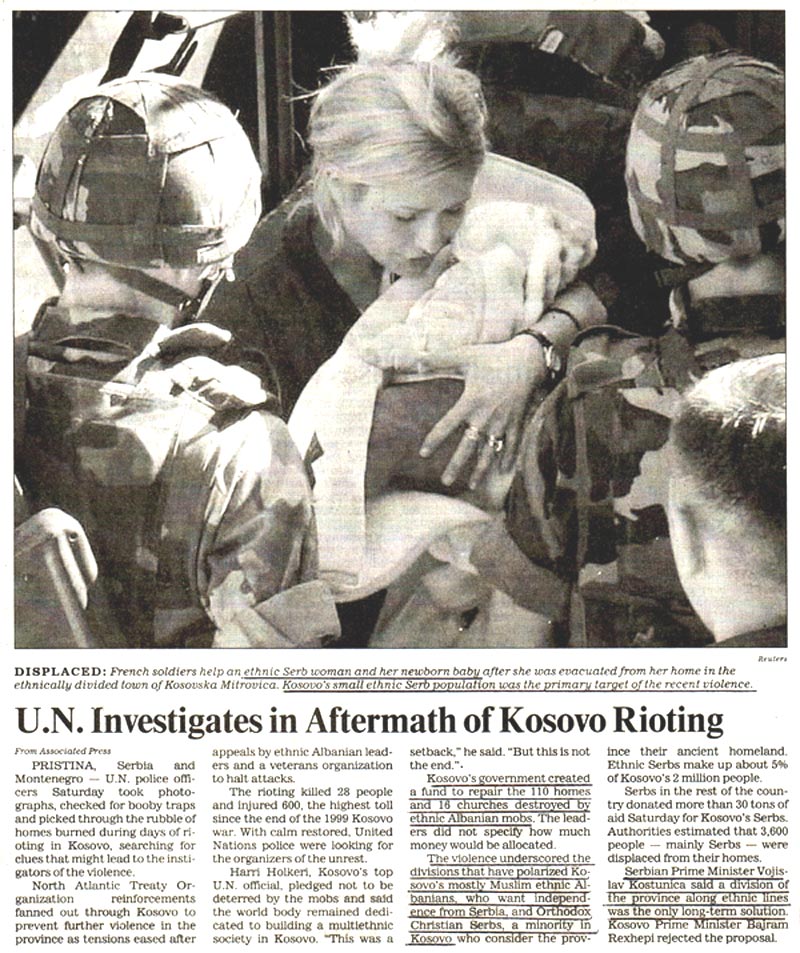
MUSLIM HATE OF SERBS!

Serbs outraged over sentence for Muslim commander
Serbian officials and media expressed outrage Saturday over the light two-year prison sentence handed down by the UN war crimes court to a Muslim wartime commander they blame for some of the worst atrocities of the Bosnian war.
Naser Oric, the wartime commander of the Muslims in Srebrenica, was convicted Friday of failing to prevent the torture and killing of Serb prisoners in the eastern Bosnian enclave. But the U.N. court decided he was not directly involved and punished him with a light two years in prison.
Oric, who spent three years in the custody of the UN court, immediately was released for time served.
The verdict enraged the Serbs, who accuse troops under Oric's command of slaughtering hundreds of Serb civilians in the villages around Srebrenica in the early years of Bosnia's 1992-95 war.
"The verdict brings into question the credibility of the
(Hague) court," said Aleksandar Simic, an adviser to Serbia's prime minister,
Vojislav Kostunica.
US Accused of Siding With 'Criminals and Jihadists' in Kosovo
By Nathan Burchfiel
CNSNews.com Staff Writer
July 21, 2006
(CNSNews.com) - A prominent Serbian Orthodox bishop Thursday said the
U.S. was allowing Islamic extremists to wage war on Christians in Kosovo by
deciding not to oppose Kosovo's independence.
Kosovo is an autonomous province in Serbia with a population of about 2 million,
most who are ethnic Albanian and Muslim. It is currently administered by the
United Nations Interim Administrative Mission in Kosovo (UNMIK), but
negotiations which began this year are expected to eventually result in
independence for the province.
However, Dr. Artemije Radosavljevic on Thursday issued a warning about the
prospect of and independent Kosovo.
"At a time when America is leading the free world in a global struggle against
jihad terror, Kosovo-Metohija must not continue to be an exception, where for
reasons we do not understand, American officials have taken the side of the
criminals and jihadists," Artemije said during a news conference in Washington,
D.C.
Artemije, the bishop of Raska-Prizren and Kosovo-Metohija, has traveled to the
United States on several occasions to meet with government officials and urge
them to oppose independence for Kosovo.
He told reporters that the region has become a "black hole of corruption and
crime" since it became a protectorate of the United Nations in 1999, following
NATO bombings that were intended to encourage then-Serbian President Slobodan
Milosovic to withdraw his forces from Kosovo.
Since 1999, the Kosovar Albanians have targeted Serbian Orthodox Christians,
according to Artemije, allegedly burning down more than 150 churches, driving
more than 220,000 Christians from the region and killing thousands more.
Granting Kosovo independence from Serbia would make Serbian Christians more
vulnerable to violence from the region's Muslim majority.
"Detaching Kosovo from democratic Serbia," Artemije said, "would mean a virtual
sentence of extinction for my people in the province and create a rogue state in
which the terrorists are the government."
He added that there have been thousands of Christians captured and killed by
Muslim extremists, including numerous videotaped beheadings. "Why are jihad
beheadings an outrage in the rest of the world, but not when they're happening
in Kosovo to Christian Serbs?" Artemije asked.
Artemije said he has had several meetings with Bush administration officials and
members of Congress during his current visit, but a spokesman declined to name
the individuals with whom the bishop met. Artemije told reporters that his
current trip to the U.S. has been more successful than the one he took in
February of this year.
"There certainly has been movement forward judging by the number of meetings,
the quality of meetings, the atmosphere in which the talks where held and the
obvious presence of a desire to help," he said.
In an October 2005 report titled: "Why Independence for Kosovo?" prepared by
Muhamedin Kullashi and Besnik Pula - intellectuals from the city of Prishtina --
they argued that independence is the "only historically justified and
politically viable solution that will guarantee peace, stability and development
in the Balkans."
"Placing sovereignty in Prishtina's hands will finally enable Kosovo's
integration into regional, European and global institutions, and allow its
emergence from the institutional, political and diplomatic isolation imposed by
the international administration of UNMIK, as a result of the unresolved
status," they wrote.
Muhamedin and Besnik also claimed that "the key generator of conflict in Kosovo
was Serbia's aggressive and repressive policy against the local Albanian
population, and not any hatred or lack of trust between ethnic communities."
"With its aggression and campaign of ethnic cleansing in 1999, Serbia lost any
legitimacy to rule over Kosovo in any shape or form," they wrote.
U.S. State Department spokesman Terry Davidson told Cybercast News Service
that the United States has "not said explicitly that we're for independence
or against independence. It just has to be something that takes the various
interests into account and protects the minority populations as well."
He said further information could be found in the remarks that Ambassador Frank
Wisner, the U.S. representative to the Kosovo Status Talks, made during
interviews with Voice of America radio on June 23.
"The issue today is to put in place the structure of a Kosovo that will be
stable," Wisner said last month, one that "will provide the basis of a
functioning society that can evolve into a full partner in a greater European
and Western community."
Wisner told Voice of America that, "Whatever the future will be in terms of
final status -- whether Kosovo will be independent or something else -- Kosovo
Serbs are going to need protections that will guarantee them their full rights."
He also declined to offer an opinion on whether Kosovo should be granted
independence from Serbia, but said the region's final status would be addressed
"during 2006."